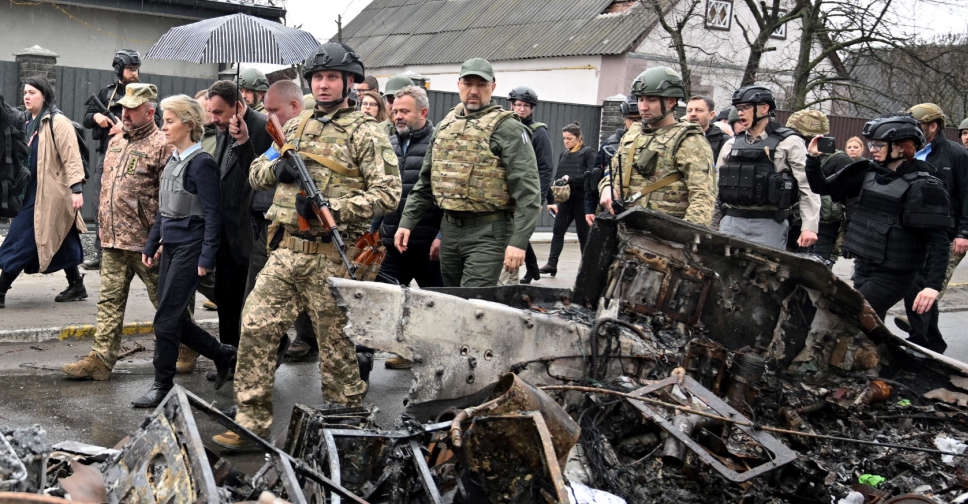
European Commission President Ursula von der Leyen said that Russian forces appeared to have committed war crimes by targeting civilians in Ukraine and insisted that lawyers investigate the alleged incidents.
Leaving Ukraine after a visit, she said she had seen with her own eyes on Friday the destruction in the town of Bucha near Kyiv. A forensics team began exhuming a mass grave on Friday containing the bodies of civilians who local officials say were killed while Russians occupied the town. Read full story
"My instinct says: If this is not a war crime, what is a war crime, but I am a medical doctor by training, and lawyers have to investigate carefully," von der Leyen told reporters on board a train leaving Ukraine on Saturday.
"I saw the photos (Ukrainian prime minister) Denys Shmyhal showed me: Killing people as they are walking by. We could also see with our own eyes that the destruction in the city targeted civilian lives. Residential buildings are no military target", she said, referring to Bucha.
Moscow has rejected allegations by Ukraine and Western nations of war crimes and has denied targeting civilians in what the Kremlin calls a "special military operation" to demilitarise and "denazify" its neighbour.
On Tuesday, the Kremlin said that allegations that Russian forces had executed civilians in Bucha were a "monstrous forgery" aimed at denigrating the Russian army.
On Friday, the same day that von der Leyen and Josep Borrell, the EU's chief diplomat, visited Kyiv and its outskirts, Ukraine and its allies blamed Russia for a missile attack that killed at least 52 people at Kramatorsk train station in eastern Ukraine.
The RIA news agency quoted the Russian defence ministry as saying the missiles said to have struck Kramatorsk station were used only by Ukraine's military and that Russia's armed forces had no targets assigned in Kramatorsk on Friday.
Von der Leyen said the EU is working with Ukraine in a joint investigation team to gather evidence of possible war crimes for use in future court cases.
"It is extremely important that it is well documented to prevent defeats in court because the evidence is not good enough," von der Leyen said.
The International Criminal Court's chief prosecutor, Karim Khan, said he had opened an investigation into possible war crimes in Ukraine last month, the news agency reported on Saturday, quoting Russia's Defence Ministry.

 UK inquiry finds 'chilling' cover-up of infected blood scandal
UK inquiry finds 'chilling' cover-up of infected blood scandal
 Iranian President Raisi killed in helicopter accident, state media says
Iranian President Raisi killed in helicopter accident, state media says
 ICC prosecutor seeks arrest warrants for Israeli, Hamas leaders
ICC prosecutor seeks arrest warrants for Israeli, Hamas leaders
 Assange given permission to appeal against US extradition
Assange given permission to appeal against US extradition
 Israel intends to broaden Rafah sweep, Defence Minister tells US
Israel intends to broaden Rafah sweep, Defence Minister tells US




